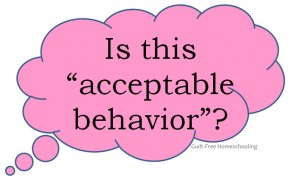Perhaps you have, or know, or used to be the child who repeatedly asks “Why?” to every remark that is spoken, whether by a parent, sibling, or friend. Usually it starts with the preschooler who truly is trying to gain knowledge about the world he lives in. However, if continued unchecked, in a few short years it can turn into a game of “How long does it take to frustrate Mom?” because, no matter what Mom says, he can again ask “Why?”
If you allow it, children will use “Why?” as a game to push your buttons more than they will use it as a way to gain knowledge. The first time you get caught not paying attention and find yourself answering half a dozen why’s in a row, your child will realize he has stumbled onto a fascinating game. (As long as I keep asking “Why,” Mom will keep trying to answer. I wonder how long this will continue!)
Before I answered the never-ending question too quickly, I gave my child some time and encouragement to think the situation through and reason it out for himself. Then if he still did not understand, I allowed the question and answered it. I tried to provoke a discussion with the child by turning the questions back on him and asking for his opinion of why. Sometimes my student could derive the correct solution on his own, and sometimes he needed an adult’s perspective in order to see a more accurate view. Expanding the conversation to a discussion will either a) satisfy the child’s thirst for real knowledge, or b) take all the fun out of his frustration game and convince him to change activities.
By no means should the question “why” be forbidden completely; on the contrary, it is a valuable learning tool when applied to research. We should always encourage questioning when it will lead to learning. Our responsibility as parents and educators is to distinguish the motive behind the question: is the child seeking to understand or is the child attempting to annoy? I answer reasonable questions to the best of my ability, but I do not give complete control of the conversation over to the child by allowing incessant, meaningless questions. I believe in turning their questions into teaching opportunities.




 Guilt-Free Homeschooling is the creation of Carolyn Morrison and her daughter, Jennifer Leonhard. After serious disappointments with public school, Carolyn spent the next 11 years homeschooling her two children, from elementary to high school graduation and college admission. Refusing to force new homeschooling families to re-invent the wheel, Carolyn and Jennifer now share their encouragement, support, tips, and tricks, filling their blog with "all the answers we were looking for as a new-to-homeschooling family" and making this website a valuable resource for parents, not just a daily journal. Guilt-Free Homeschooling -- Equipping Parents for Homeschooling Success!
Guilt-Free Homeschooling is the creation of Carolyn Morrison and her daughter, Jennifer Leonhard. After serious disappointments with public school, Carolyn spent the next 11 years homeschooling her two children, from elementary to high school graduation and college admission. Refusing to force new homeschooling families to re-invent the wheel, Carolyn and Jennifer now share their encouragement, support, tips, and tricks, filling their blog with "all the answers we were looking for as a new-to-homeschooling family" and making this website a valuable resource for parents, not just a daily journal. Guilt-Free Homeschooling -- Equipping Parents for Homeschooling Success!

Recent Comments